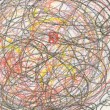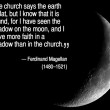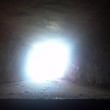Pope Benedict on the “Dark Passages” of Scripture
by Jimmy Akin
Filed under The Bible

There are certain Bible passages, particularly in the Old Testament, that are disturbing. The question of how these are to be interpreted has been with us for a long time, and apologists and Bible scholars--not to mention Church Fathers and theologians--have made many suggestions. A while back, former Pope Benedict provided some guidance. Here's what he had to say . . . Verbum Domini The document in which he made his remarks is titled Verbum Domini, which is Latin for "The Word... Read More
What Faith Is and What it Isn’t
by Bishop Robert Barron
Filed under Faith

The Protestant theologian Paul Tillich once commented that “faith” is the most misunderstood word in the religious vocabulary. I’m increasingly convinced that he was right about this. The ground for my conviction is the absolutely steady reiteration on my Internet forums of gross caricatures of what serious believers mean by faith. Again and again, my agnostic, atheist, and secularist interlocutors tell me that faith is credulity, naïvete, superstition, assent to irrational nonsense,... Read More
Confusing the Arguments for God
by Douglas Beaumont
Filed under The Existence of God

In this article I wish to offer some clarification on different categories of arguments for the existence of God. I am not weighing in on the relative value any of them here. Rather, I am just pointing out some distinctions and categories that are often confused or missed at the popular level. Also, due to non-standard nomenclature, specific argument titles are not as important as the actual arguments. Regardless of labels, it is important to keep these distinctions in mind when arguing... Read More
Catholicism and Free Thought
by Fr. Dwight Longenecker
Filed under Anthropology, Religion, Uncategorized

Many people believe that Catholicism, because it is a dogmatic religion, stifles free thought and free speech. “How nice for you,” some will say to a Catholic convert, “Now that you’re a Catholic, you won’t have to think anymore.” Or, “It must be nice to be a Catholic and have such ‘certainty.’” This is said with a snuffling, cynical laugh because by ‘certainty’ they often mean that one has become a mindless robot—a Kool Aid drinking cult member following... Read More
Did the Church Teach the Earth was Flat?
by Jon Sorensen
Filed under Christianity and Science

When I was young I was taught in school that Christians believed the Earth was flat. In this view, it was not until Christopher Columbus’ historic journey to the “New World” that the Church became forced to accept this as fact and do away with its false belief. The idea that Christians believed in a flat Earth has been taught in school textbooks, short films, and is believed by many even today. This notion of history stuck with me through my years as an atheist, during which I'd... Read More
Raising Children Without God?
by Trent Horn
Filed under Religion

On a recent CNN iReport, a user named TXBlue08 provides seven reasons why she chooses to raise her children without belief in God. Her essay has already been viewed over 800,000 times. Given its popularity, I'd like to examine her seven reasons: "1. God is a bad parent and role model. Good parents don’t allow their children to inflict harm on others. “He has given us free will,” you say? Our children have free will, but we still step in and guide them." Parents discipline their... Read More
The YouTube Heresies
by Bishop Robert Barron
Filed under Religion

A few years ago I began posting brief reflections on movies, music and culture on YouTube, probably the most watched Web site in the world. In my mind, this exercise resembles St. Paul's venture onto the Areopagus in Athens, preaching the Gospel amid a jumble of competing ideas. YouTube is a virtual Areopagus, where every viewpoint—from the sublime to the deeply disturbing—is on display. Never as a Catholic teacher or preacher have I addressed less of the "choir.” The most... Read More
A First Without a Second: Understanding Divine Causality
by Dr. Edward Feser
Filed under The Existence of God

NOTE: Dr. Feser's contributions at Strange Notions were originally posted on his own blog, and therefore lose some of their context when reprinted here. Dr. Feser explains why that matters. For the Thomist, to say that God is the First Cause of things is, first and foremost, to say that He is the cause of their existence at every moment at which they do exist. God creates things out of nothing precisely in the act of conserving them in being, and apart from His continual... Read More
A Mind Prepared for Wonder
by Dominicans of the Province of St. Joseph
Filed under Science

I enjoy reading Edward O. Wilson much more than Richard Dawkins, and recently I started to ask myself why this might be. Both are good writers and present difficult scientific concepts in easy-to-understand language. Both work in the controversial area of sociobiology and the evolution of human beings. Both are post-Christian thinkers with little interest in the nuances and delicacies of theological reasoning. What separates these two men? And, even when I don’t agree with him, what... Read More
The Case for Life After Death
by Dr. Peter Kreeft
Filed under Anthropology

Can you prove life after death? Whenever we argue about whether a thing can be proved, we should distinguish five different questions about that thing: Does it really exist or not? "To be or not to be, that is the question." If it does exist, do we know that it exists? A thing can obviously exist without our knowing it. If we know that it exists, can we be certain of this knowledge? Our knowledge might be true but uncertain; it might be "right opinion." If it is certain, is there... Read More






